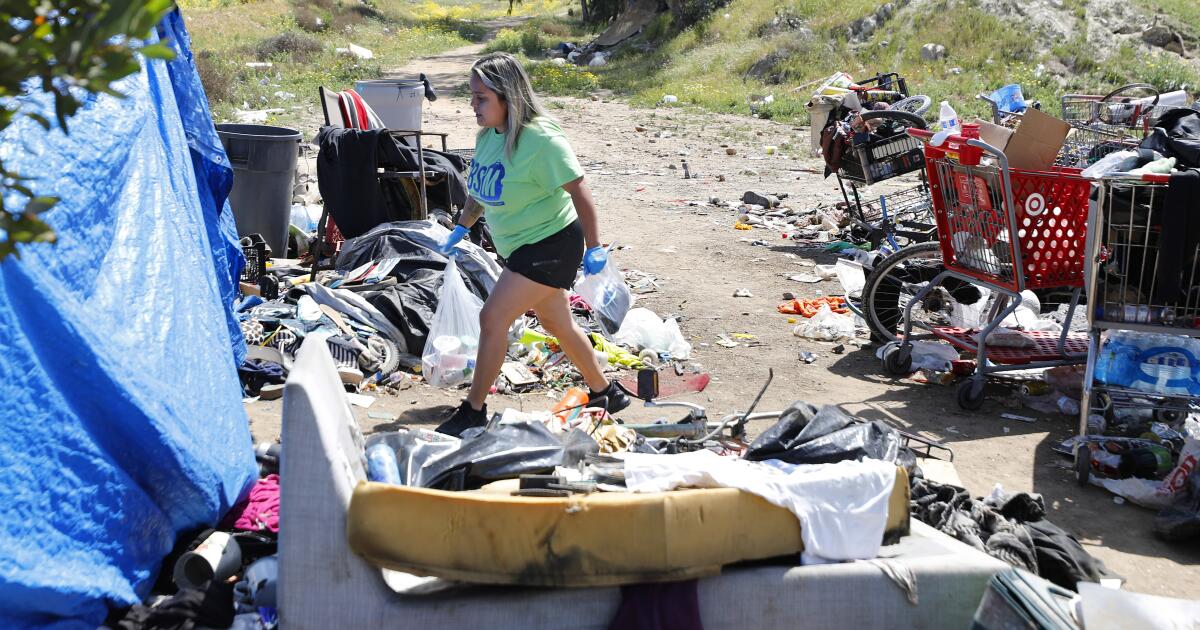

Community Through Hope, the Chula Vista charity that provided food, showers and other help to unsheltered people across the South Bay in recent years, generated a lot of sympathy when it announced last month that it was shutting its storefront due to a lack of resources.
Founder and chief executive Rosa Vasquez blamed the COVID-19 pandemic and a spike in demand for services for the unfortunate downturn in revenue. But she nonetheless pledged to build back the organization with the help of more donations.
“We are not giving up,” Vasquez told CBS 8 last month. “We really do believe that if folks stop and look at our work and value the work, then we will get the support that we need.”
But state and federal records show the tax-exempt organization is not legally permitted to solicit or accept donations — and hasn’t been for years.
Community Through Hope was alerted to its delinquent status by the state Attorney General’s Office in May 2021 after failing to pay registration fees or file an annual tax return. Its federal tax-exempt status was formally revoked last year.
Delinquent and revoked charities cannot legally do business in California.
But the state and federal designations did not stop Community Through Hope from raising millions of dollars, according to a draft tax filing the organization provided to The San Diego Union-Tribune after being asked about the delinquency status.
The federal tax return for the 2022 fiscal year showed Community Through Hope generated $2.9 million between 2018 and last year. The nonprofit collected $640,000 in revenue in 2022 and closed the year with $177,000 in total assets.
But the same document for the 2021 tax year lists $1.1 million in revenue over three years. The annual revenues reported for 2019, 2020 and 2021 are different from the numbers listed on the 2022 tax filing.
It is not clear whether the 2021 and 2022 tax returns supplied by Community Through Hope have been filed with state and federal regulators; the records are not stamped as received by the agencies and do not appear on public databases.
Vasquez indicated that her organization had grown too fast and she was simply unable to properly comply with all of the various rules a tax-exempt organization is required to meet.
“CTH was a small nonprofit that during the pandemic stepped up to provide nutrition to thousands of sheltered and unsheltered individuals and chose to outsource our taxes to a 3rd party service,” she wrote.
Fundraising halted
Vasquez declined to explain the differences in reported revenue, as well as other discrepancies in the internal tax documents. Instead, the Community Through Hope founder said last week that the organization has suspended all fundraising and sought expert help to correct its reporting issues.
“Community Through Hope is working along with our accounting and legal team to address and rectify our delinquent status with the IRS,” Vasquez said in a statement. “CTH no longer accepts any monetary donations and removed all donation portals from its social media and website.”
The announcement came this past Wednesday, five weeks after the Union-Tribune first asked the organization why it was raising money while listed as delinquent.
Earlier last week, the organization’s website was still soliciting donations from the public.
Vasquez also said she sought professional guidance after suspending services.
“CTH has also taken steps to consult with local nonprofit experts in order to complete this process in transparency,” the statement Wednesday said. “CTH is no longer providing any gap services to clients at our current location.”
Beyond the conflicting revenue data, Vasquez also declined to say why Community Through Hope reported no board members on the federal tax filings, or why she reported 24 employees one year and no workers the prior year.
May Harris, a San Diego attorney whose For Purpose Law Group specializes in nonprofit leadership and management, said lax record-keeping and reporting practices by any exempt organization harms other charities — and the public.
“We have to have faith in the nonprofit that people can rely upon and that the organization is compliant and transparent in what they are doing and how they are reporting out what they are doing,” she said.
“That’s part of the compact between the government and a nonprofit organization to receive that tax-exempt status,” Harris added. “That compact is an agreement that they will comply with the law because their assets are charitable assets of the public, not of any individual.”
Two former board members contacted by the Union-Tribune said they left the organization because they were not provided critical financial information or documents. They asked not to be identified because they did not want to be publicly associated with the charity.
The 2022 federal return states that Community Through Hope was independently audited, but Vasquez declined to release the audit as required under state law. The tax filing also does not disclose that two of Vasquez’s children are or were employees, as state law also requires.
‘Close the door softly’
Community Through Hope first began helping unsheltered people within the last decade. It was formally incorporated as a tax-exempt organization in 2018, records show.
According to the IRS, the charity filed what’s called a Form 990-N in each of its first two years. Form 990-Ns are simple declarations that an exempt organization raised and spent less than $50,000 during the specified tax year.
But in early 2021, Community Through Hope reported financial information to the state that appeared to contradict prior filings.
The charity filed a document with the state attesting that it had $338,558 in revenue over the year ending June 30, 2020, and expenses totaling $273,206. It also reported $69,474 in assets.
The financial data reported to the California Department of Justice also conflict with information reported on the tax filings the charity provided to the Union-Tribune.
It’s not clear where all of the money raised by Community Through Hope in recent years came from. Some documents indicate most of it was donated by the public; others say most of it came from government grants.
At least some support was approved by the city of Chula Vista, which agreed in 2020 to award the nonprofit $30,000 for a food-distribution effort, with options for two additional years.
But the grant was pulled after just one year, with little comment or explanation from city officials.
Community Through Hope will “close the door softly on our relationship with the city,” Vasquez said at the time.
By May 2021, state regulators were warning the charity that it needed to both pay its annual $75 registration fee and file a new tax return.
“In order to clear your organization’s delinquent status and comply with the law, please submit the following reports, together with the information requested above to complete the current fiscal year’s filing requirements,” the Attorney General’s Office told the charity.
According to state and federal databases, Community Through Hope has not filed tax returns since.






